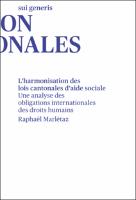L'harmonisation des lois cantonales d'aide sociale
Une analyse des obligations internationales des droits humaines
Author(s)
Marlétaz, Raphaël
Collection
Swiss National Science Foundation (SNF)Language
FrenchAbstract
The federal constitution gives the Swiss cantons a great deal of freedom to regulate their social welfare systems. There are still great differences in this area. People living in Switzerland, depending on their place of residence, do not all have access to the same benefits and therefore do not enjoy the same protection against poverty. This phenomenon has a significant impact on the enjoyment of human rights, which are the subject of international conventions ratified by Switzerland and which must be implemented throughout the country. In this context, this book examines whether these international guarantees require a harmonization of cantonal social welfare laws. In the light of the recent global pandemic of COVID-19, which does not stop at the cantonal borders and which severely affects the precarious populations of Switzerland, this question is very topical. The author responds to this question by demonstrating, according to several legal criteria, different concrete obligations of harmonization. This approach makes it possible to move towards a global response to a problem that affects and will affect in the future many individuals of the Swiss population, regardless of where they live: poverty. This doctoral thesis was defended on September 7, 2020 at the Faculty of Law of the University of Lausanne. The jury, composed of Professor Evelyne Schmid (thesis director), Professor Pascal Mahon, Professor Kurt Pärli, Professor Véronique Boillet and Professor Vincent Martenet, admitted this thesis with magna cum laude.
Keywords
human rights; Public international law; Constitutional law; Public Law; Cantonal law; Social welfare; Harmonization; Federalism; Poverty; SwitzerlandDOI
10.38107/020ISBN
9783907297209Publisher
sui generis VerlagPublisher website
https://suigeneris-verlag.chPublication date and place
Zurich, 2021Classification
Law


 Download
Download Web Shop
Web Shop